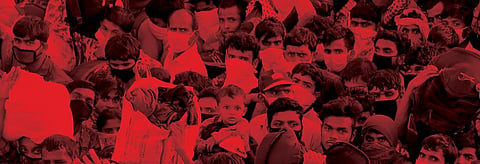COVID-19: What will be the new normal
I dare to say: COVID-19 is the most tumultuous, most catastrophic and the most defining epoch of our lifetime. I cannot think of anything else which has happened with such speed — from the end of December 2019, when the first cases were reported in China, to the middle of April 2020, when an estimated one-third of the world’s population is locked into their homes.
This crisis has no precedent — there is no rulebook that tells governments what to do; how to shut down economies; and when to re-open them. The virus is a mutant — it jumped from its animal host to humans; it is pernicious because it seems to find new ways to hide itself; and, we can be asymptomatic and yet be a carrier of infection. Deadly and devastating.
But what we should be really thinking about is the collective vulnerability of our world. The most macho leaders; the most high-tech scientific establishments; and the most mighty economic prowess have all met their match in this lowly virus. It should make us humble — think about what we need to do differently; how we need to act and behave differently. But this is where I suspect we will err.
The fact is that every time there is a catastrophic event, the focus is on the immediate — the relief and the rescue — and not on what we must learn for the future. And there is no doubt that the exigencies of COVID-19 management are most urgent and dire.
We are losing lives in the rich world — which has hospitals and health infrastructure. Just imagine the scale of the human tragedy in the emerging-developing world where none of this exists. But then also imagine the sheer scale of the human deprivation as jobs are taken away — the economies of the poor are not based on the security of tenure, but on their daily earnings.
But there is going to be life after COVID-19. So, what will be the new normal? Let’s discuss the most critical issue of our globalised world: What leaders and institutions must learn from COVID-19 for the next planetary emergency. The hard fact is that we know we should have acted together and we did not.
China did not share information quickly enough; the virus moved out of the country and spread infection; the World Health Organization (WHO) did not act swiftly enough; or, maybe its voice was not respected enough to be heeded. Till the end of January, WHO was hedging its bets on the containment of the virus in China — it came out against global travel bans and hummed and hawed about the need to elevate the crisis to a pandemic.
Then when it acted, it floundered against the sheer scale of the health emergency. It has lost credibility in this period, and this at a time when the world needs strong voices to steer it ahead. The United Nations Security Council did not meet for weeks, and when it did, it just whimpered and died.
It is not just about China and WHO — each country has shown that it is for itself in this crisis — a dog-eat-dog world. It has reached the point where countries are pirating protective equipment — masks and gowns that are needed for healthcare workers, competing for medicine supplies and sparring about who will make the first vaccine.
It is frightening to think of this when we know that the coronavirus pandemic is an outcome of an interdependent globalised world. The fact is that the virus definitely came from a province in China, where I have no reason not to say its citizens have a dystopian relationship with food.
But the contagion grew because we live in such an interconnected world. It is also clear that we are as strong as our weakest link. If the virus continues to spread in some region of the world — most probably the one with the least healthcare services or one that is ravaged by war and strife — it will stay with us. We will not win this, unless we win it together.
That’s why the pathetic state of today’s global leadership should concern us. There are many respected voices who are arguing that COVID-19 shows the end of multilateralism — it’s the death of the UN and all that it stood for. Now, it will be unilateralism at its worst that will set the new world order.
But this will not do — not for COVID-19 and certainly not for the next and looming planetary emergency of climate change. Very much like COVID-19, climate change needs global leadership — if one country continues to emit, then all actions of the rest will be negated. But if we want all countries to act, then we must build a cooperative agreement, one in which the last person, the last country, has its right to development.
We need global leadership in a globalised inter-dependent world. So, in the new normal of the post-COVID-19 world, we must remember this. How we fix this is the question for tomorrow. But fix it, we must.


